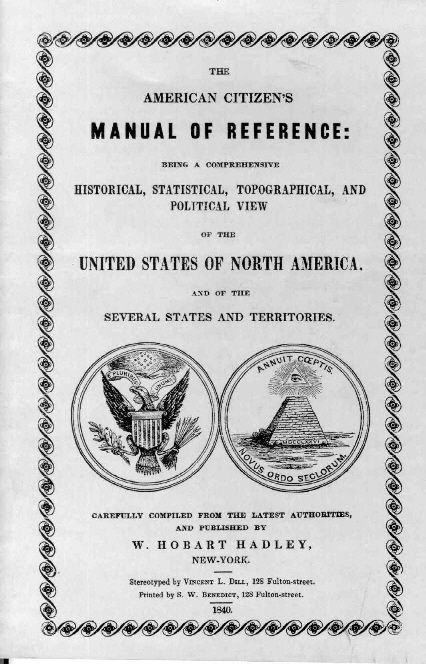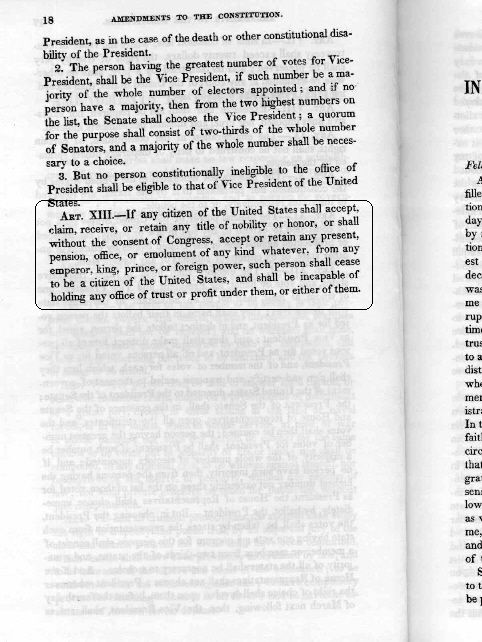BoscoX
Posts: 11270
Joined: 12/10/2016
Status: online

|
quote:
ORIGINAL: Real0ne
quote:
ORIGINAL: Musicmystery
Look up panic, then look up concern. Then look up Constitution, and why it's important to actually follow it.
Then look up the duties of the president, starting with the Oath of Office and what it commits a president to regarding the Constitution.
Then maybe you can sit at the grown-ups table and discuss it without looking ridiculous.
You know -- like Trump's meeting with Republican members of Congress, when he expressed his admiration for Article 12 of the Constitution, apparently unaware that there are only seven Articles.
http://www.politico.com/magazine/story/2016/08/2016-donald-trump-constitution-guide-unconstitutional-freedom-liberty-khan-214139
LOL, come on, the amendments are articles (articles of amendment) and the amendments are part of the constitution. I have heard it expressed that way and written that way by many authors.
Article 12 U.S. Constitution
The Electors shall meet in their respective states, and vote by ballot for President and Vice-President, one of whom, at least, shall not be an inhabitant of the same state with themselves; they shall name in their ballots the person voted for as President, and in distinct ballots the person voted for as Vice-President, and they shall make distinct lists of all persons voted for as President, and of all persons voted for as Vice-President, and of the number of votes for each, which lists they shall sign and certify, and transmit sealed to the seat of the government of the United States, directed to the President of the Senate;--The President of the Senate shall, in the presence of the Senate and House of Representatives, open all the certificates and the votes shall then be counted;--The person having the greatest number of votes for President, shall be the President, if such number be a majority of the whole number of Electors appointed; and if no person have such majority, then from the persons having the highest numbers not exceeding three on the list of those voted for as President, the House of Representatives shall choose immediately, by ballot, the President. But in choosing the President, the votes shall be taken by states, the representation from each state having one vote; a quorum for this purpose shall consist of a member or members from two-thirds of the states, and a majority of all the states shall be necessary to a choice. And if the House of Representatives shall not choose a President whenever the right of choice shall devolve upon them, before the fourth day of March next following, then the Vice-President shall act as President, as in the case of the death or other constitutional disability of the President. (See Note 14)--The person having the greatest number of votes as Vice-President, shall be the Vice-President, if such number be a majority of the whole number of Electors appointed, and if no person have a majority, then from the two highest numbers on the list, the Senate shall choose the Vice-President; a quorum for the purpose shall consist of two-thirds of the whole number of Senators, and a majority of the whole number shall be necessary to a choice. But no person constitutionally ineligible to the office of President shall be eligible to that of Vice-President of the United States.
Proposal and Ratification The twelfth amendment to the Constitution of the United States was proposed to the legislatures of the several States by the Eighth Congress, on the 9th of December, 1803, in lieu of the original third paragraph of the first section of the second article; and was declared in a proclamation of the Secretary of State, dated the 25th of September, 1804, to have been ratified by the legislatures of 13 of the 17 States. The dates of ratification were: North Carolina, December 21, 1803; Maryland, December 24, 1803; Kentucky, December 27, 1803; Ohio, December 30, 1803; Pennsylvania, January 5, 1804; Vermont, January 30, 1804; Virginia, February 3, 1804; New York, February 10, 1804; New Jersey, February 22, 1804; Rhode Island, March 12, 1804; South Carolina, May 15, 1804; Georgia, May 19, 1804; New Hampshire, June 15, 1804.
Ratification was completed on June 15, 1804.
The amendment was subsequently ratified by Tennessee, July 27, 1804.
The amendment was rejected by Delaware, January 18, 1804; Massachusetts, February 3, 1804; Connecticut, at its session begun May 10, 1804.
Good job, I didn't know that. The president elect's vast, deep knowledge of the constitution apparently Trumps Musical's hysterical rantings as well.
|

 Profile
Profile









 New Messages
New Messages No New Messages
No New Messages Hot Topic w/ New Messages
Hot Topic w/ New Messages Hot Topic w/o New Messages
Hot Topic w/o New Messages Locked w/ New Messages
Locked w/ New Messages Locked w/o New Messages
Locked w/o New Messages Post New Thread
Post New Thread